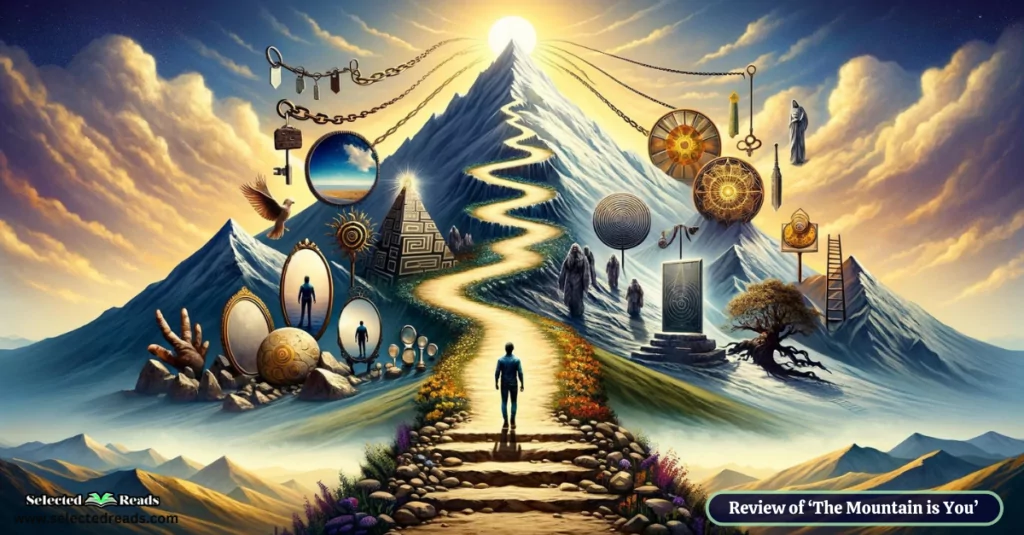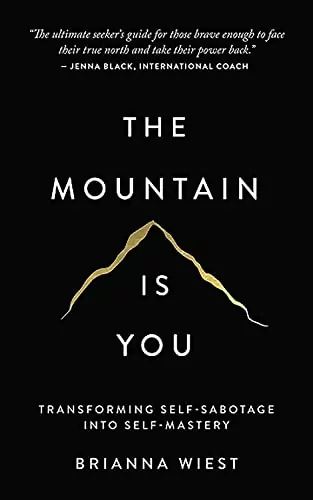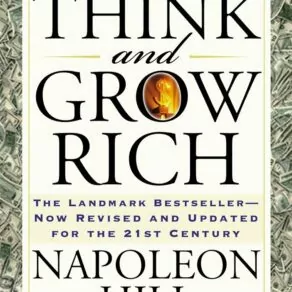Today’s book review post focuses on Brianna Wiest’ s “The Mountain Is You: Transforming Self-Sabotage into Self-Mastery.” This is a self-help book that outlines a practical roadmap to help you navigate the rugged terrains of our inner landscapes, a guide that shines a light on the shadowy paths of self-sabotage that we all too often find ourselves wandering down.
Our discussion will proceed as follows: First, we start with an extended summary of the book capturing its underlying messages. Next, we discuss the main themes that make up the narrative build-up of the book followed by some memorable quotes by Brianna wIEST. Finally, we conclude with a collection of thought-provoking questions for book club discussions.
The Mountain Is You Summary
“The Mountain Is You: Transforming Self-Sabotage into Self-Mastery” by Brianna Wiest is an insightful and transformative self-help book that delves into the complexities of self-sabotage and offers practical solutions for overcoming these tendencies.
The book is divided into two sections: the first focuses on identifying and understanding self-sabotaging behaviors, while the second provides actionable steps and techniques to replace these behaviors with self-mastery.
In the first section, Wiest explores the psychological and emotional underpinnings of self-sabotage. She identifies common triggers, such as fear of failure, fear of success, low self-esteem, and past traumas, which can lead individuals to unconsciously undermine their own progress and happiness. The author asserts that self-sabotage is rooted in deep-seated beliefs that we are undeserving of success or happiness, and that these beliefs often stem from early childhood experiences.
The book also delves into the concept of the “shadow self” – the aspects of our personality that we are unwilling to acknowledge or accept. Wiest explains that by repressing these traits, we create internal conflicts that can lead to self-sabotage. She encourages readers to embrace their shadow self, as doing so is essential for personal growth and self-acceptance.
In the second section, Wiest provides a step-by-step guide to transform self-sabotage into self-mastery. The author offers practical techniques and exercises, such as journaling, meditation, visualization, and affirmations, to help readers identify and overcome their self-sabotaging patterns. She emphasizes the importance of self-awareness and self-compassion in breaking the cycle of self-sabotage, as well as setting realistic goals and expectations for oneself.
Additionally, Wiest focuses on the power of mindset, advocating for a shift from a fixed mindset to a growth mindset. She believes that by embracing challenges and viewing failures as learning opportunities, individuals can develop resilience and ultimately overcome self-sabotaging behaviors. The author also explores the significance of creating healthy habits, maintaining a support network, and setting boundaries as crucial steps in achieving self-mastery.
“The Mountain Is You: Transforming Self-Sabotage into Self-Mastery” is a thought-provoking and practical guide that empowers readers to confront and overcome their self-sabotaging behaviors.
Related: As A Man Thinketh Summary and Takeaways
Takeaways from The Mountain is You
Here are some key takeaways from The Mountain Is You by Brianna Wiest are:
1. Understand the roots of self-sabotage: The book explores the psychological and emotional causes of self-sabotage, such as fear of failure or success, low self-esteem, and past traumas. Recognizing these triggers is essential for addressing self-sabotaging behaviors.
2. Embrace the shadow self: Wiest emphasizes the importance of acknowledging and accepting the repressed aspects of our personality to prevent internal conflicts that can lead to self-sabotage.
3. Cultivate self-awareness and self-compassion: Developing a greater understanding of one’s thoughts, emotions, and behaviors is crucial for overcoming self-sabotage. Practicing self-compassion enables us to forgive ourselves for past mistakes and move forward with greater resilience.
4. Shift to a growth mindset: Adopting a growth mindset helps individuals view challenges as opportunities for growth and development, making it easier to overcome setbacks and reduce self-sabotaging tendencies.
5. Implement practical strategies: The book provides actionable techniques and exercises, such as journaling, meditation, visualization, and affirmations, to help identify and combat self-sabotaging patterns.
6. Create healthy habits and set boundaries: Establishing routines that promote well-being and setting boundaries to protect oneself from negative influences can aid in overcoming self-sabotage and achieving self-mastery.
7. Seek support: Building a network of supportive friends, family, or professionals can help individuals maintain accountability and motivation as they work towards transforming self-sabotage into self-mastery.
The Mountain is You Quotes
Here are some popular quotes from The Mountain Is You as featured in Goodreads:
“Don’t worry about doing it well; just do it.”
“Self-sabotage is what happens when we refuse to consciously meet our innermost needs, often because we do not believe we are capable of handling them.”
“Start quantifying your days by how many healthy, positive things you accomplished, and you will see how quickly you begin to make progress.”
“Your mountain is the block between you and the life you want to live. Facing it is also the only path to your freedom and becoming. You are here because a trigger showed you to your wound, and your wound will show you to your path, and your path will show you to your destiny.”
“In fact, crying at appropriate times is one of the biggest signs of mental strength, as people who are struggling often find it difficult to release their feelings and be vulnerable.”
“You are not too broken to find someone who actually wants you, and when you begin to recognize that you are worthy of being committed to, you’ll start choosing partners who do just that.”
“What your subconscious mind might want you to know: You are not too broken to find someone who actually wants you, and when you begin to recognize that you are worthy of being committed to, you’ll start choosing partners who do just that.”
“Emotions are temporary, but behaviors are permanent. You are always responsible for how you choose to act.”
“You are not the person you were five years ago. You evolve as your self-image does, so make sure that it’s an accurate one. Give yourself credit for everything you’ve overcome that you never thought you would, and everything you’ve built that you never thought you could. You’ve come so much farther than you think, and you’re so much closer than you realize.”
“Usually when we have a problem that is circumstantial, we are facing the reality of life. When we have a problem that is chronic, we are facing the reality of ourselves.”
Book Club Questions
Here are some thought-provoking questions to consider:
- Exploring Self-Sabotage: What personal experiences with self-sabotage resonated with you while reading this book? Can you share a time when you recognized your own self-sabotaging behaviors after reading Wiest’s descriptions?
- Understanding the Roots: Wiest delves into the psychological and emotional roots of self-sabotage. Which root causes of self-sabotage were most enlightening or surprising to you? Why?
- The Shadow Self: The concept of the “shadow self” is central to understanding our behaviors. How did the book change your perspective on embracing your shadow self? Do you agree with Wiest that acknowledging and accepting this part of ourselves is crucial for growth?
- Practical Techniques: The book offers a range of techniques to combat self-sabotage. Which techniques or exercises have you tried, or are you planning to try? Share any experiences or anticipated challenges in implementing these strategies.
- The Role of Mindset: How does Wiest’s discussion of shifting from a fixed mindset to a growth mindset align with your own beliefs and experiences? Can you provide examples from your life where a change in mindset led to personal growth or success?
- Impact of Past Traumas: Wiest suggests that past traumas play a significant role in self-sabotage. How does the book propose we address and heal from these traumas? Discuss the feasibility and potential impact of these suggestions.
- Self-Compassion and Forgiveness: The author emphasizes the importance of self-compassion and forgiveness in overcoming self-sabotage. How does practicing self-compassion change the way we deal with failure and setbacks? Share examples from your own life or observations.
- Setting Boundaries and Healthy Habits: Discuss how Wiest links the establishment of healthy habits and boundaries to overcoming self-sabotage. How do you plan to apply these concepts in your personal or professional life?
- The Power of Support Networks: Reflect on the book’s discussion about the importance of support networks in the journey towards self-mastery. How has your support network influenced your personal growth, and how do you envision strengthening these relationships after reading this book?
- Personal Takeaways and Action Plans: What are your top takeaways from “The Mountain Is You”? How do you plan to incorporate the insights and strategies from this book into your daily life to transform self-sabotage into self-mastery?
- Critique and Analysis: Were there any parts of the book that you disagreed with or found less useful? Discuss any critiques or alternative viewpoints you might have.
- Transformation Stories: Wiest encourages readers to envision their highest potential future selves. Share your vision of your highest potential self and discuss the steps you believe are necessary to achieve this transformation.
Final thoughts
“The Mountain Is You” by Brianna Wiest offers a profound journey into the heart of what it means to truly know and master oneself. Wiest doesn’t just offer insights; she provides a comprehensive toolkit for dismantling the barriers we’ve built against our own success and happiness. Her work serves as a beacon for those lost in the fog of self-doubt and fear, guiding us towards a clearer understanding of our potential and how to achieve it.
The key takeaways from “The Mountain Is You” resonate not just on a personal level but also in the broader context of teaching, learning, and guiding others. Understanding and overcoming self-sabotage is fundamental to unlocking our full potential, both as individuals and as educators. The book’s lessons on embracing our shadow self, cultivating self-awareness and compassion, and the importance of a supportive community are universal truths that can greatly enhance our approach to education and mentorship.











